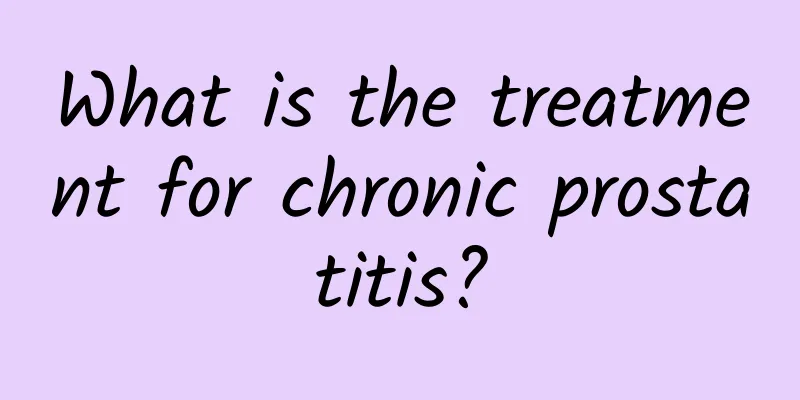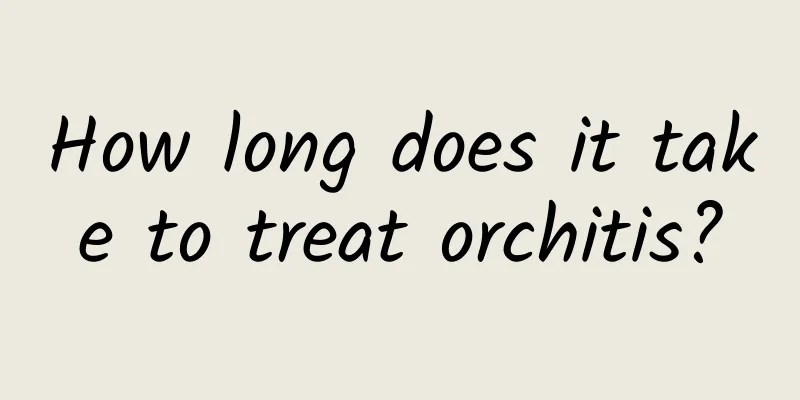What is the treatment for chronic prostatitis?

|
Patients with chronic prostatitis are more difficult to treat, and they must use some comprehensive treatment methods to achieve some improvement. Even psychological treatment is necessary, because prostatitis can cause some psychological damage to patients, and may even cause inferiority complex. So let us take a look at the treatment methods for chronic prostatitis. 1. General treatment Health education, psychological and behavioral counseling have a positive effect. Patients should abstain from alcohol, spicy food, hold urine, sit for long periods of time, keep warm, and strengthen physical exercise. 2. Drug treatment The most commonly used drugs are antibiotics, α-receptor blockers, herbal preparations and non-steroidal anti-inflammatory analgesics. Other drugs also have varying degrees of effectiveness in relieving symptoms. (1) Antibiotics: Currently, in the clinical practice of treating prostatitis, the most commonly used first-line drug is antibiotics, but only about 5% of patients with chronic prostatitis have clear bacterial infection. Chronic bacterial prostatitis: antibiotics are selected based on bacterial culture results and the ability of the drug to penetrate the prostate. After prostatitis is confirmed, the course of antibiotic treatment is 4 to 6 weeks, during which the patient should undergo periodic efficacy evaluation. Intraprostatic injection of antibiotics is not recommended. Chronic nonbacterial prostatitis: Antibiotic treatment is mostly empirical treatment, and the theoretical basis is to speculate that certain pathogens that are negative in routine culture cause the occurrence of this type of inflammation. Therefore, it is recommended to take oral antibiotics such as fluoroquinolone for 2 to 4 weeks, and then decide whether to continue antibiotic treatment based on the feedback of the efficacy. Only when the clinical symptoms are indeed alleviated, it is recommended to continue the use of antibiotics. The recommended total course of treatment is 4 to 6 weeks. (2) α-receptor blockers: α-receptor blockers can relax the smooth muscles of the prostate and bladder and improve lower urinary tract symptoms and pain, thus becoming a basic drug for the treatment of type II/type III prostatitis. Different α-receptor blockers can be selected according to the patient's condition. The recommended α-receptor blockers are: doxazosin, naftopidil, tamsulosin and terazosin. The results of controlled studies show that the above drugs have different degrees of improvement on patients' urination symptoms, pain and quality of life index. (3) Plant preparations: Plant preparations are increasingly valued for their therapeutic effects on type II and type III prostatitis and are recommended as therapeutic drugs. Plant preparations mainly refer to pollen preparations and plant extracts, which have a wide range of pharmacological effects, such as non-specific anti-inflammatory, anti-edema, and promoting bladder detrusor contraction and urethral smooth muscle relaxation. Recommended plant preparations include: Pusitai, Sabah palm and its extracts. Due to the large number of varieties, the usage and dosage must be determined according to the patient's specific condition, and the course of treatment is usually in months. Adverse reactions are relatively small. (4) Nonsteroidal anti-inflammatory analgesics: Nonsteroidal anti-inflammatory analgesics are empirical medications for the treatment of symptoms associated with type III prostatitis. Their main purpose is to relieve pain and discomfort. (5) M-receptor blockers: M-receptor blockers (such as tolterodine) can be used to treat prostatitis patients who have symptoms such as urinary urgency, frequent urination and nocturia but no urinary tract obstruction. The above article tells us in detail the treatment methods of chronic prostatitis. So while cooperating with the treatment, patients should still choose some diets that are more beneficial to their bodies, such as millet or black beans, which are good for their stomachs. |
<<: What are the precautions after prostate surgery?
>>: What are the symptoms of chronic prostate disease?
Recommend
What causes the testicles to shrink?
The testicles are the common name for male testic...
Why is sperm red?
It is very scary if there is such a situation dur...
Is kissing addictive? Kissing techniques that make women addicted
In love, kiss is a romantic label. The more frequ...
When is male hormone secreted? What is good to eat?
Hormones are very important to our human health. ...
If a man has these symptoms, be careful of hidden testicles!
Cryptorchidism is commonly known as hidden testic...
Frequent urination after circumcision
Many men have a problem with excessive foreskin. ...
Do you understand these precautions when checking sperm viability?
Pre-pregnancy check-up is something that many fam...
The difference between prostatic fluid and semen
Semen is also composed of prostatic fluid. Someti...
Thyroid cancer is highly prevalent. Do you know where the root cause lies?
Thyroid cancer is on the rise every year. What ar...
What to do if the penis does not develop
In fact, many people are very concerned about the...
What is the reason why men cannot urinate completely?
Many men have the problem of urinating in their l...
Three massage techniques for women to help you treat prostatitis
For handsome guys who sit in front of computers f...
Is it easy to cure kidney deficiency in men?
Kidney deficiency in men is the main disease that...
Black spots on genitals
Many people have spots not only on their faces, b...
The right testicle is also enlarged and has a lump. What is the cause?
The testicles are an important part of sperm prod...









